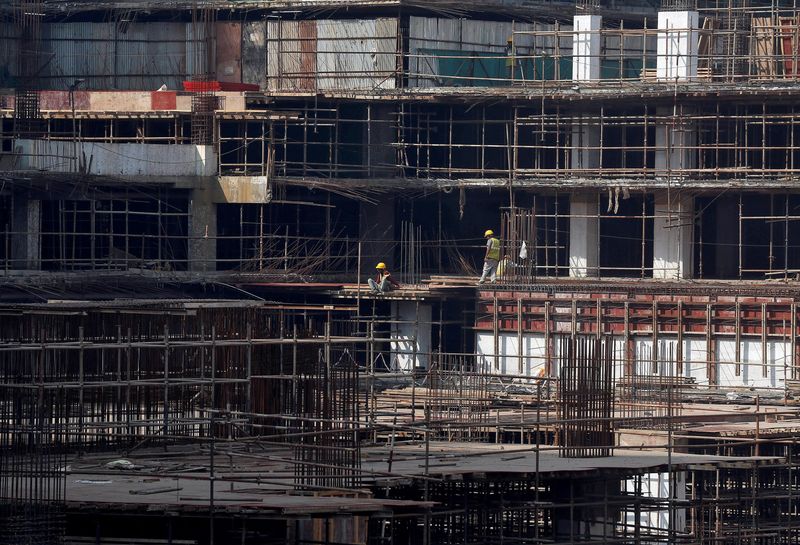2/2

© Reuters. FILE PHOTO: Construction workers work on a site of a residential building in Mumbai, India, November 30, 2016. REUTERS/Shailesh Andrade
2/2
By Manoj Kumar
NEW DELHI (Reuters) – Rising crude oil prices and supply disruptions following Russia’s invasion of Ukraine could further sap an Indian economy already slowed by COVID-19, posing risks to household spending and private investments, economists said.
India, which meets nearly 80% of its oil needs through imports, could be hit by a widening trade deficit, weakening rupee and higher inflation after Brent crude prices shot above $105 a barrel last week, the economists said. [O/R]
The “surge in oil prices as a result of the (Ukraine) crisis poses considerable risks to the Indian economy,” Aditi Gupta, an economist at Bank of Baroda, said in a note on Friday.
India’s economy probably grew 6% year-on-year during the three months to end-December, a survey showed last week, slower than the previous two quarters, with new fears rising over slowing momentum after Russia’s invasion of Ukraine.
The median forecast from a survey of 38 economists interviewed between Feb. 21 and 23, was that gross domestic product in Asia’s third-largest economy grew 6% year-on-year in the October-December quarter, after expanding 20.1% in the April-June period and 8.4% in July-September.
The growth forecasts ranged from 3.0% to 7.5%. India is set to announce its GDP data for the end-December period and new estimates for the year to end-March on Monday at 1200 GMT.
A 10% rise in crude oil prices could lower India’s GDP growth by 0.2 percentage points, while posing risks to corporate profit margins as they would not be able to pass on rising input costs, Sonal Varma, an economist with Nomura Holdings (NYSE:NMR), in a research note.
Private consumption, which contributes nearly 55% to India’s GDP, is also still below pre-pandemic levels after a severe blow to household incomes from two years of pandemic disruption.
Three waves of COVID-19 have pounded small businesses, hitting restaurants, tourism, educational institutions and retail, and causing huge job losses.
New Delhi, however, says the economy has been on the mend due to its reforms and vaccination programme, and that the third pandemic wave in January had a limited economic impact.
“Supply shortages remain a near-term headwind. But when they do ease, the recovery should start picking up in earnest,” said Shilan Shah, an economist at Capital Economics in Singapore.
The Reserve Bank of India (RBI), which has slashed its repo rate by a total 115 basis points since March 2020 to cushion the shock of the COVID-19 pandemic, has maintained its accommodative monetary stance to support the economic recovery.
RBI has projected economic growth of 9.2% for the fiscal year to March 31, 2022, and 7.8% for the following year.
Source: Investing.com




























